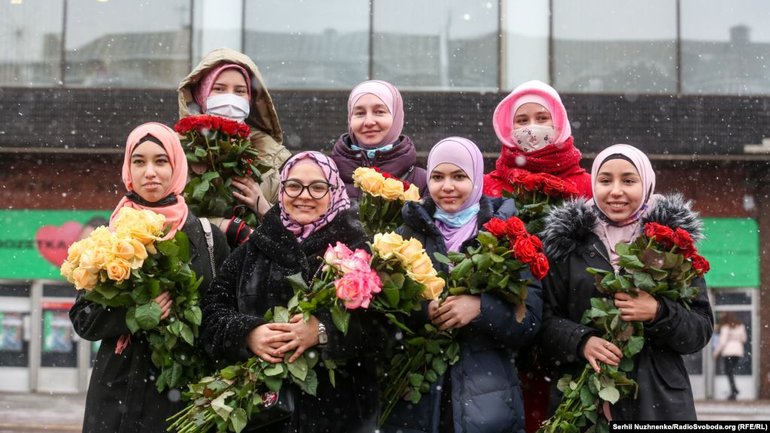Celebrating World Hijab Day in Kyiv (photo gallery)

A Muslim woman named Nazmi Khan came up with the idea of the holiday. Her family moved from Bangladesh to America, where they did not give up their religious beliefs.
A girl in a hijab had to endure misunderstandings from society. So she decided to talk about the history, traditions and proper wearing of the hijab. Later, she suggested creating a holiday in honor of the hijab in order to overcome negative stereotypes about Islam.
According to religious rules, Muslim women are required to wear these clothes. The hijab usually consists of two parts. Bonet or amirka is a headdress that helps keep your hair in a pile. Externally, you wear a scarf. First, it is fixed under the chin. And then they wrap it around the head and fix it like this. The face remains open.
In the city center of Kyiv, Muslim women in hijabs with bouquets of flowers in the middle of the day distributed flowers to passers-by girls. So they drew attention to the World Hijab Day.
The meeting was organized by the All-Ukrainian Association of Muslim women, whose activists take part in the action. The organization also noted that such events were held not only in Kyiv.
Radio Svoboda (Liberty) has prepared a set of photos dedicated to the World's Hijab Day.

2. Today, on February 1, the whole world celebrates the Hijab Day, and on this day Muslim women decided to please Ukrainian women and show that we Muslim women do not wish harm to anyone, we want good, we want to cheer them up and give them flowers," said one of the participants of the action in Kyiv.

3. Winter Kyiv is filled with flowers and smiles.

4. Hijab is the women's clothing that complies with Sharia law should cover a woman's body and hair.

5. You can leave your face, hands, and feet below your ankles uncovered.

6. A smile from under the mask is still a smile.

7. Many people call the hijab a burqa. But this is nothing more than a common misconception. The burqa should be called the headdress that is worn in Saudi Arabia – it is black in color and covers the entire face, leaving only the eyes open.

8. Red roses are loved by women in and without hijabs.

9. On Monday, February 1, it was snowing in Kyiv. The daytime air temperature was -4...-6 °C. But the smiles overcame the cold.

10. In Ukraine, Islam is practiced by about 1% of the population (1-3 million people as of 2017), the majority of Muslims live in the eastern regions and in the Crimea.

11. Feminists who support the voluntary wearing of the hijab most often interpret it as a sign of diversity and identity.









